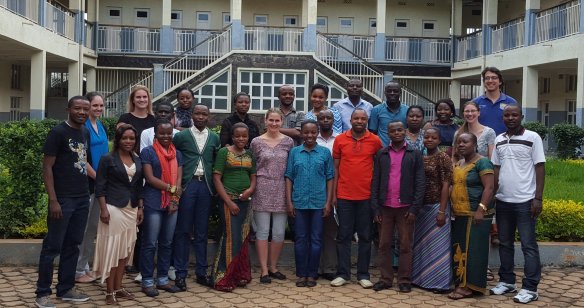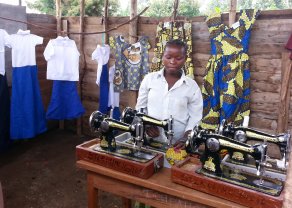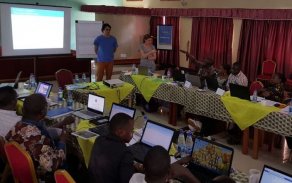I have just returned from two weeks in Congo. PRIO colleagues Ragnhild Nordås, Siri Aas Rustad and I held project meetings with our local partner. Most of our time in Congo, however, was spent teaching how to conduct research.

Motivated participants and teachers at the research training. Photo: Ali Rock
The Democratic Republic of Congo (DRC) is often described as one of the most dangerous countries in the world in which to be a woman. Female Empowerment in Eastern DRC is a project supported by the Research Council of Norway that focuses on ways of improving the situation of women in eastern Congo who have survived brutal sexual violence. The project is a collaboration between the Peace Research Institute Oslo (PRIO) and the International Centre for Advanced Research and Training (ICART), a recently established research centre in Bukavu, the capital of the South Kivu province. ICART is the product of a collaboration between a local university and Panzi Hospital, headed by Dr Denis Mukwege.
Lacking knowledge about what works

Production of school uniforms. Photo: Gudrun Østby, PRIO
Panzi Hospital is a unique centre of expertise in the treatment of injuries caused by sexual violence. It is also involved in maintaining a range of different programmes offering social, economic, legal and psychological support to women who have survived this type of violence. A key goal is to empower these women to fend for themselves. The support programmes teach the women everything from how to read and write to sewing school uniforms, making bags, soap-making, growing fruit and vegetables and animal husbandry – or how to start a small business. We have insufficient knowledge, however, of what happens to these women when they return to their local communities and start new lives for themselves and their children. Many have been abandoned by their husbands and extended families because of the shame associated with what has happened to them. As a result, they often have to start again from scratch.
Local ambitions to do research
When we met Dr Mukwege for the first time in 2012, he explained that many Western researchers came to his hospital to gather data and interview women, but that local people were hardly involved at all in the actual research. Overall, there has been an enormous lack of locally based research. The main reason for this is the limited infrastructure available for managing research projects and a lack of resources for training and capacity building. These issues have been the most important motivation for our joint project.
The project consists of two parts. The first is thematically oriented and focuses on identifying the best measures for safeguarding the economic futures of women who have suffered sexual violence. The second is designed to boost the local research capacity through workshops and the intensive training of ICART researchers in topics such as research methods and academic publishing.
The research process from A to Z on the curriculum
We are working in parallel on research and research training. Since the project started in 2014, the PRIO team has visited Congo three times and trained our partner and other local researchers in subjects such as research design, research methods, various open-source tools such as GIS (geographic information systems), R (a statistics program), ODK (a program used to design questionnaires), and academic writing and scholarly publishing, as well as how to present research findings. The goal is for participants to receive training in the research process from A to Z (from initial concept to final publication).

A discussion of different research methods to measure economic welfare. Photo: Siri Aas Rustad, PRIO
We have approximately 25-30 participants on our research training programme. They are a diverse group, ranging from students studying for master’s degrees in peace and conflict studies to doctors from Panzi Hospital and field managers of various support programmes. Their starting points are very diverse, but they are all highly motivated and share a genuine desire to be able to conduct research of various kinds.
The work involves many challenges, but most importantly, teaching this group is incredibly enjoyable. The participants are very proactive and we have many exciting debates during the training sessions. Often we have to improvise. For example, when I started to talk about obtaining an overview of the research literature about a particular field, it turned out that only a couple of the participants had heard of Google Scholar. So we then devoted a session to learning how to search for literature using this search engine.
When it comes to actual research, ICART and PRIO collaborate closely at every stage. Recently we completed a survey of 1,200 women (of whom about 400 had been the victims of serious sexual violence) in South Kivu. Currently we are working together with ICART to analyse the resulting data. The overarching goal is to arrive at research-based recommendations about what types of measures may be most effective in creating livable lives for thousands of Congolese women.
- A Norwegian version of this text was published at forskning.no 1 December 2015
- Translation from Norwegian: Fidotext